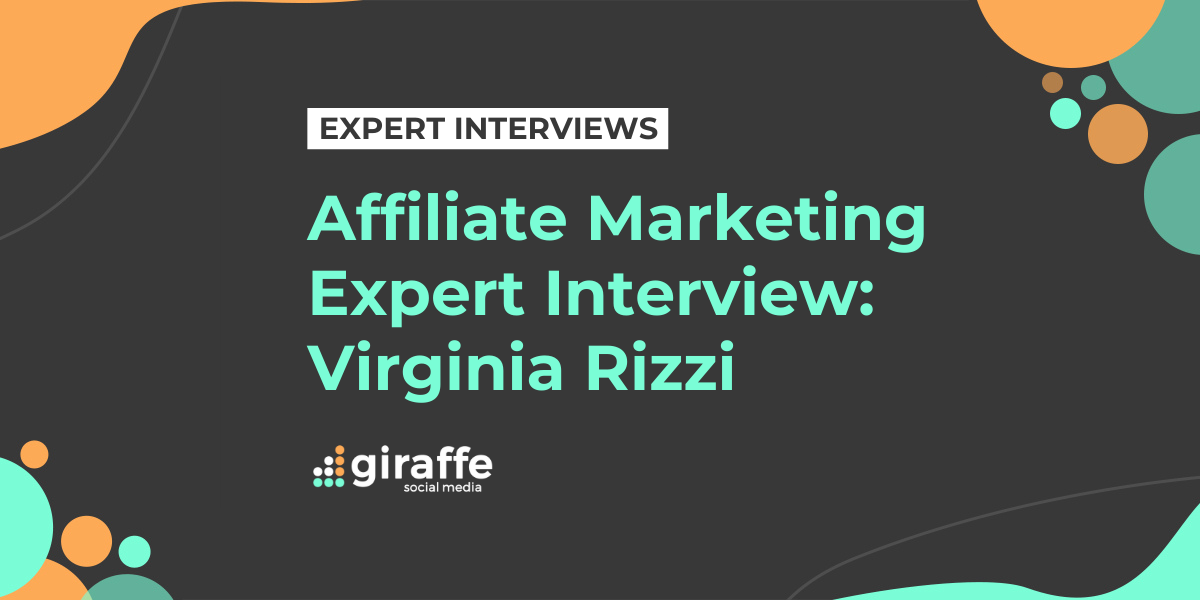Affiliate marketing expert Virginia Rizzi kindly joined us on Giraffe Social Media podcast #59 to chat about all things affiliate marketing. In this interview, Virginia shares how affiliate marketing has changed throughout the pandemic, how it shapes up to influencer marketing, and her predictions for affiliate marketing in the future.
About Virginia: Virginia Rizzi is the Head of Affiliate Marketing at Glass Digital. Virginia has been at Glass Digital since 2018, with a total of 9 years working in affiliate marketing under her belt.
About Glass Digital: Glass Digital is a digital marketing agency that specialises in SEO, paid search, and affiliate marketing.
The below interview has been transcribed from episode 59 of the Giraffe Social Media podcast and has been paraphrased throughout.
When you break it down into simple terms, how does affiliate marketing work?
Affiliate marketing is a type of performance-based marketing that works in a simple manner. Where one person who refers another person to a business will earn a commission, affiliate marketing works in the same way, just online. There are three parties involved: a group of affiliates, a brand, and – in the middle – a provider to connect the affiliate sites to the brand. When those affiliate sites bring traffic and conversion, we reward them with a commission.
Affiliate marketing is fairly cost-effective because we only pay commission to affiliates when a sale is validated after the returns period. For the brand, it works out as not too much to spend per sale as you only pay affiliates for verified purchases.
Has affiliate marketing taken a dive during the pandemic, due to consumer habits changing?
I would say no, we’ve been lucky as our clients have actually seen a big increase in sales over the pandemic. Unfortunately, the pandemic has affected multiple sectors, especially the hospitality sector. But overall, affiliate marketing has seen a 10% increase globally. It’s been good for us to be able to showcase what we can deliver to our clients.
There have been changes in consumer habits, for example, older generations shopping online for the first time due to lockdown as opposed to visiting stores in person. There have also been increases in click-and-collect purchases, with people shopping online but collecting in-store.
We’ve also seen customers getting savvier online shopping for deals, with a focus on product reviews and comparisons as customers put more research into their purchases.
Can you talk us through the different types of affiliate marketing campaigns?
I’d like to first point out that any site could potentially become an affiliate, so long as we can integrate the affiliate link onto their site. From this perspective, there are so many opportunities for affiliate campaigns.
Traditional affiliate marketing campaigns involve things like voucher code sites, cashback sites, etc. We approach different voucher code sites and ask if they’d like to promote our client’s brand. When the brand’s vouchers are live on the site, any customer that completes a purchase from that voucher code site will generate commission for that voucher site.
For cashback sites, it works similarly, but the cashback goes back to the customer rather than going towards commission. Over the pandemic, we saw a rise in usage of cashback sites that send the cashback as donations to causes or organisations, such as the NHS, which was good to see.
When I started working in affiliate marketing 9 years ago, I mostly saw these traditional types of campaigns. Now, however, affiliate marketing has evolved into opportunities to work with publications, comparison sites, custom CSS codes, product reviews, and so much more.
Like any kind of marketing, it’s important to be able to adapt. What are some strategies to help businesses adapt their affiliate marketing strategy as consumer trends continue to shift?
In affiliate marketing it’s important to plan ahead; we have a promotion calendar with key dates for seasonal sale periods (such as Black Friday) that we know perform particularly well for affiliates. We’ve also learnt over the past couple of years that seasonality might change so we need to focus on key aspects that perform well for each client.
There are also more last-minute promotions to be aware of – we do plan for the long term, but you need to be quite quick to understand what’s going on with industry news and updates. It even comes down to the little things like the current weather, we know that people are less likely to be online shopping on a sunny day, so we put less budget on those days.
It’s also really important to focus on demographics. If, for example, we have stock we need to shift, we target the demographics that would buy that certain product. When a website has a different variety of products, if we feel a little bit stagnant, we can target slightly different customers that are different from the core demographic, which is exciting. So, not only do we need to know the demographics and keep a close eye on customer behaviour, but we also need to know the product really well so we can get creative and sell it!
Now I want to talk a little bit about Influencer Marketing because almost 20% of companies spend over half their marketing budget on Influencers.
Is it common to integrate affiliate marketing with influencer marketing? How similar are the two?
They can both work on a performance basis, and we do have some influencer activity within our affiliate marketing. We can reward influencers for bringing traffic or sales, they’re really useful for us to build brand awareness for our clients.
The main difference between influencer marketing within affiliate marketing compared to standalone/common influencer relationships is the type of influencer we target. Within affiliate marketing, brand awareness is important, but we are really focused on ROI (return on investment). We tend to work with nano and micro-influencers as they have a much higher (on average) engagement rate than certain bigger influencers – in affiliate marketing, we see better ROI from influencers with fewer followers.
Is it easier to track your ROI when working with affiliate links with influencers?
It is, but there are varying ways we work with influencers and affiliate links. For example, we’ll often look for influencers that have blogs, so their content will include an affiliate link that is always active and available. It’s easier to measure the results and conversions from these links compared to temporary short-term swipe-up links on Instagram stories. It also means that the affiliate link can be used months or years later and still work to generate commission for the affiliate.
We know what works well per social media platform, so we tailor our campaigns based on the platforms used as well as audience/demographic and product type. On YouTube, we’ll have affiliate tracking links as they will always work, but in an organic social media post, we’ll perhaps utilise a voucher code instead to extend the lifespan of the campaign.
We mentioned recently on the podcast that Instagram is thinking about introducing an affiliate marketing feature on their app. What’s your take on this and how does that affect agencies like Glass Digital?
I’m personally always excited when there’s something new within affiliate marketing, so I’m looking forward to seeing how it pans out. I think it is a great feature for content creators to have to monetise their content – it’s always great for them to be rewarded for their efforts. It has the potential to be huge.
One concern I have is making sure influencers/content creators are rewarded for their work and that Instagram would keep it fair and not take a cut of the commissions.
Another worry is that we tend to prefer the customer be redirected to the brand’s site so if they can just shop within Instagram, they wouldn’t get the full experience of the brand. In this sense, it could be slightly detrimental for brand awareness and long-term shopping, but it could be good for quickly selling certain items.
What are your future predictions for affiliate marketing?
I think the biggest talking point right now is about cookie-less tracking and cookies in general, this is something we’ve been discussing for the last couple of years. I believe we may eventually move away from cookie tracking which is great as browser cookie blocking will not get in the way.
I’m also seeing more and more publications working on an affiliate basis, for a similar reason – cookie blockers. We feel that affiliate marketing is a good opportunity for publications that may have lost investment to utilise affiliates and monetise their content.
Finally, I think there will be more emerging technology in affiliate marketing. Not only traditional affiliate campaigns (vouchers, cashback, comparison sites) but also more tools and technology that will help conversions, stop fraud, and improve the customer journey.
Click here to listen to the full interview on episode #59 of the Giraffe Social Media podcast. You can also find us on your favourite podcast app, including Apple Podcasts, Spotify, and Google Podcasts.






